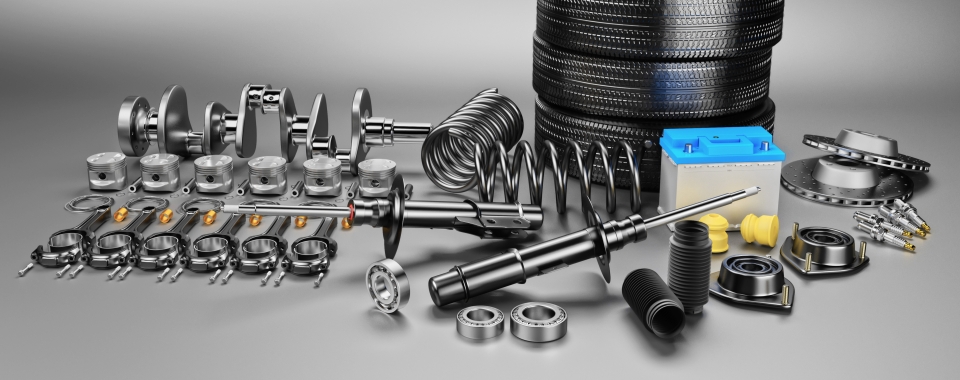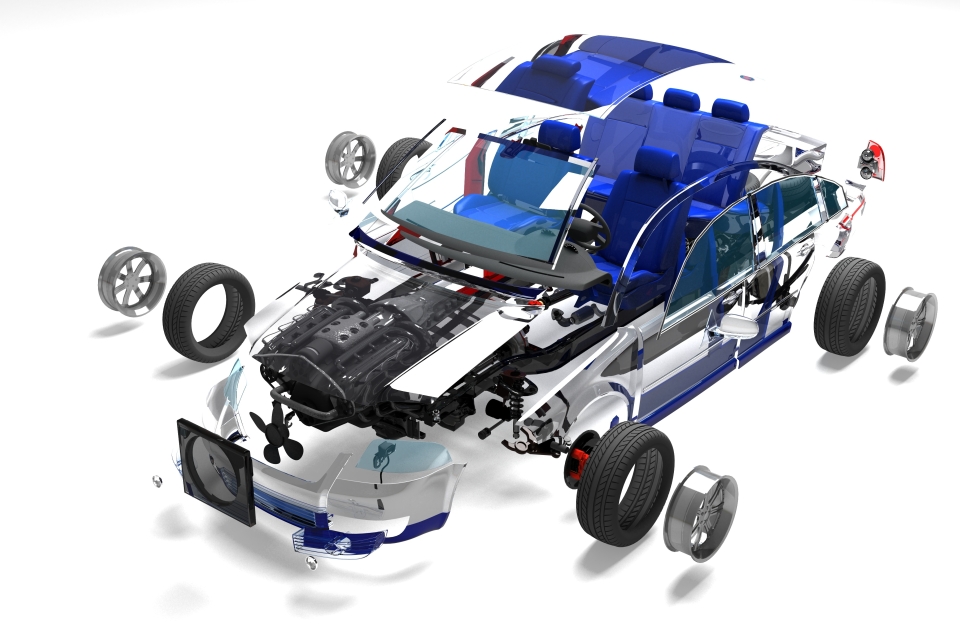Taiwanese Auto Parts Suppliers Paving the Way in the EV Revolution
2024/03/22 | By CENS
Unsung Stars Inside Automobiles
Experiencing a substantial and consistently growing export base each year, Taiwan's auto parts industry has earned certification from various international authorities for its high quality, garnering recognition from industry insiders.
Primarily composed of small or medium-sized enterprises (SMEs), Taiwan's manufacturers exhibit a comprehensive array of production types. Upstream component manufacturers supply various automobile parts such as seats, pistons, and gears... Midstream suppliers contribute functional modules like dashboards, bumpers, and generators... Downstream manufacturers provide integrated systems such as engine systems, steering system parts, ADAS, etc. In Taiwan, you can find almost all the auto parts you need.
Moreover, the combination of a variety of production types in smaller quantities, along with cost-effective pricing, positions Taiwan's manufacturers as highly competitive on the international stage. However, even with these strengths, what the world needs today is not solely this.

Transformation of Industry
According to Da-Jeng Yao, General Director of the Mechanical and Mechatronics Systems Research Laboratories at the Industrial Technology Research Institute (ITRI), the trend towards net-zero emissions and carbon neutrality is gaining prominence. Related regulations, such as the carbon border adjustment mechanism (CBAM), are beginning to be implemented. CBAM involves imposing a carbon tariff on carbon-intensive products imported into the European Union. It will take effect in 2026, with reporting starting in 2023. This is expected to impact products like steel or aluminum-made auto parts.
In response, the Taiwanese government introduced the "2050 Net Zero Transition" policy objective in 2022, and aiming for a 24% carbon reduction by 2030 as a key milestone. This initiative encompasses four strategies: "Energy Transition," "Industrial Transition," "Lifestyle Transition," and "Social Transition." Under the industrial transition strategy, the government provides assistance in four main areas for industries. These include carbon quantification and reporting, enhancing mitigation capabilities, updating information, and capacity building in the financial industry. Additionally, the government plans to enlist major emitters to lead the transition and support others in compliance. It also aims to collaborate with sectoral associations and leverage state-owned enterprises as examples in this transition process.
Furthermore, in 2023, the Industrial Development Administration (IDA) under the Ministry of Economic Affairs (MOEA) coordinated interagency resources and initiated the manufacturing industry subsidy program geared towards promoting low carbonization and intellectualization transformation. This program offers grants of up to NT$30 million for eligible applications, underscoring the government's commitment to environmental policy implementation.
In light of these policies, Taiwan manufacturers demonstrate receptiveness to reform. For instance, Yao cited China Motor, which, along with 11 suppliers such as Hersheen, Ying Ming, Kian Shen, Wuu Shiang, Uni Auto Parts, Tai Yue, Shin Choung, and Chun Yuan… has been awarded a total subsidy of NT$110 million for project implementation. Moving forward, these companies will collectively undertake 41 energy-saving projects. However, alongside carbon reduction efforts, the ongoing trend of electric vehicles is also driving significant change.

Paradigm Shift Triggered by Electric Vehicles
In recent years, thanks to technological advancements, reduced production costs, and heightened competition among vehicle manufacturers, the once lofty prices of electric vehicles have steadily declined, bringing them within reach of the general public on the international market.
Consumers have responded favorably to this shift. According to a report from the Automotive Research & Testing Center (ARTC), the global electric vehicle market surpassed the 10 million unit milestone as early as 2022, with 10.52 million units sold annually. Concurrently, Taiwan's EV sales soared to 29,329 units (comprising both BEV and PHEV) in 2023, marking a remarkable 60% annual growth rate and nearly a 36-fold increase compared to the 795 units sold just five years ago in 2018.
These figures underscore the intensifying trend toward "banning petrol cars" and the growing demand for electric vehicles (EVs), which is reshaping the auto parts industry itself. Highlighting this trend, Yao elaborated on the paradigm shift occurring within the auto parts supply chain. As a result, the demand for new types of auto parts and related technologies, such as electric motor parts, battery technologies, and electronic control systems, is on the rise. Meanwhile, the demand for traditional fuel vehicle parts is expected to gradually decrease, given that EVs or hybrid electric vehicles (HEVs) rely purely or partially on electric power. Consequently, there will be less demand for fuel systems such as crankshafts, pistons, and injectors.
To address these forthcoming challenges, Yao suggests that Taiwanese suppliers could capitalize on their existing technological expertise for transformation and upgrading. Take Batom Co., Ltd., for instance. Established in 1981, this seasoned gear manufacturer has been specializing in fuel vehicle parts manufacturing for over 40 years. In recent years, Batom has received support from the Mechanical and Mechatronics Systems Lab at ITRI. With this assistance, the company has developed one-speed and two-speed transmission modules, which serve as core components in the powertrain of electric vehicles, alongside the motor.
Additionally, Yao recommends forming industrial unions and establishing "national EV teams" to facilitate cooperative research and development processes. This approach would enable companies to quickly grasp the similarities and differences between the research and development of electric vehicles or self-motorized vehicle products and their existing automotive component products. Consequently, companies can formulate development strategies and enhance their technological capabilities accordingly.

For instance, take the MIH Consortium, an open EV ecosystem initiated by Foxconn, which fosters collaboration within the mobility industry. The consortium focuses on realizing key technologies, developing reference designs and standards, and bridging gaps between ecosystem members. This approach lowers barriers to entry, accelerates innovation, and shortens development cycles. Additionally, the Taiwan Advanced Automotive Technology Development Association (TADA) is another influential association worth noting. The Association's main tasks include promoting and integrating Taiwan's ICT industry into the advanced automotive sector and enhancing the international competitiveness of Taiwan's advanced automotive industry.
ITRI also plays a crucial role in the era of electric vehicles (EVs), Yao proudly shared. The Vehicle Division of the Mechanical and Mechatronics Systems Lab has accumulated significant EV research and development achievements. These include EV matching and system integration, motors, batteries, electronic control systems, mobility and transmission, X-by-Wire controllers for chassis-by-wire technology, safety assistance, and autonomous driving systems. Additionally, they provide system integration, HiL simulation, testing, and vehicle validation services. These contributions position ITRI as Taiwan's strong ally in the global shift towards intelligent electric vehicles.




